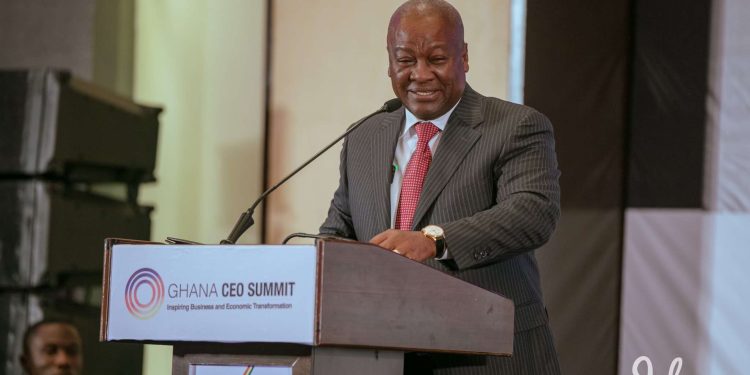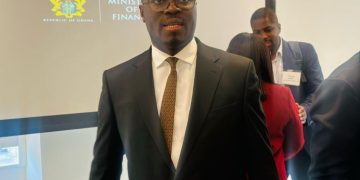President Mahama Outlines Eight-Pillar Strategy to Stabilise Ghana’s Economy and Restore Investor Confidence
President John Dramani Mahama has announced a sweeping eight-point economic recovery plan aimed at restoring investor confidence, deepening fiscal discipline, and driving long-term growth.
Speaking at the 9th Ghana CEO Summit themed, “Leading Ghana’s Economic Reset: Transforming Business and Governance for a Sustainable Futuristic Economy,” on Monday, May 26, President Mahama laid out the core tenets of his administration’s economic programme, signalling a return to the capital market while also pushing for strategic investments in infrastructure and export development.
The strategy, which hinges on Ghana’s ongoing relationship with the International Monetary Fund, marks a sharp effort to stabilise the fiscal outlook, reopen access to capital markets, and reposition the country as a regional trade and investment hub.
1. IMF Programme Completion Anchored in Fiscal Prudence
President Mahama underscored his government’s commitment to completing the IMF-supported Extended Credit Facility by 2025, with a targeted fourth review in June. A formal exit strategy is expected in 2026, after which Ghana will enter into a policy support phase with the Fund to cement gains.
“Our economic recovery must be anchored in credibility,” President Mahama said, adding that his administration would maintain strict controls on borrowing and public spending to ensure fiscal sustainability.
2. Reopening Capital Markets Through Reform-Driven Confidence
In a bid to rebuild market access, President Mahama disclosed plans to re-engage both domestic and international bond markets in coordination with the IMF, local banks, and the Ghana Stock Exchange. Future borrowing, he insisted, would be strictly tied to commercially viable, self-financing public sector projects.
This move comes on the heels of Ghana’s historic sovereign debt restructuring, which saw the country default on Eurobond payments before securing an IMF bailout in late 2022.
3. Bolstering Sovereign Wealth and Municipal Financing
President Mahama also announced legislative reforms to enforce mandatory contributions to the Sinking and Stabilisation Funds, which had been depleted during the recent fiscal crisis. These reforms aim to rebuild fiscal buffers and insulate the economy from external shocks.
Additionally, he proposed enabling local governments to issue infrastructure bonds to fund critical projects in transport, education, and sanitation — a move that could decentralise capital expenditure and improve service delivery.
4. Clearing Verified Arrears and Streamlining Public Investment
A comprehensive audit of government arrears is currently underway, the President said, adding that only verified claims will be honoured. Going forward, public investments will be guided by national priorities and resource availability, with a shift away from politically driven capital projects.
5. Revamping Public Financial Management Architecture
To rein in inefficiencies, Mahama pledged to accelerate public financial management reforms, including full implementation of the Treasury Single Account, real-time budget execution systems, and integration of the Ghana Revenue Authority’s tax administration framework.
These measures, he argued, will help plug revenue leakages, reduce corruption, and enhance budgetary discipline.
6. Export Revitalisation via Ghana Exim Bank
Mahama’s plan includes repositioning the Ghana Exim Bank to drive export diversification and promote non-traditional exports, particularly in agro-processing, light manufacturing, and SME development. The objective, he noted, is to enhance foreign exchange earnings and generate employment across value chains.
7. Positioning Ghana as West Africa’s Commercial Hub
A key pillar of the strategy is transforming Ghana into a regional trade and services hub within the African Continental Free Trade Area (AfCFTA). The government will prioritise investments in ports, logistics, financial services, digital infrastructure, and industrial corridors to deepen Ghana’s integration into continental value chains.
8. Infrastructure Spending to Spur Growth
President Mahama concluded with a renewed commitment to infrastructure development as a lever for inclusive growth. Flagship projects in transport, energy, housing, and urban renewal will be financed through a mix of public-private partnerships, concessional financing, and the administration’s “Big Push” investment framework.
“Our strategy is not just about recovery,” Mahama said. “It is about building a resilient and competitive economy that works for all Ghanaians.”
With investor sentiment cautiously returning after months of macroeconomic volatility, market watchers will be closely monitoring the implementation pace of Mahama’s reforms and the government’s ability to sustain fiscal consolidation while delivering on social and development priorities.








